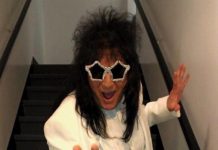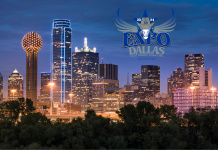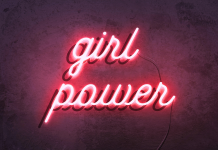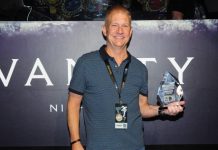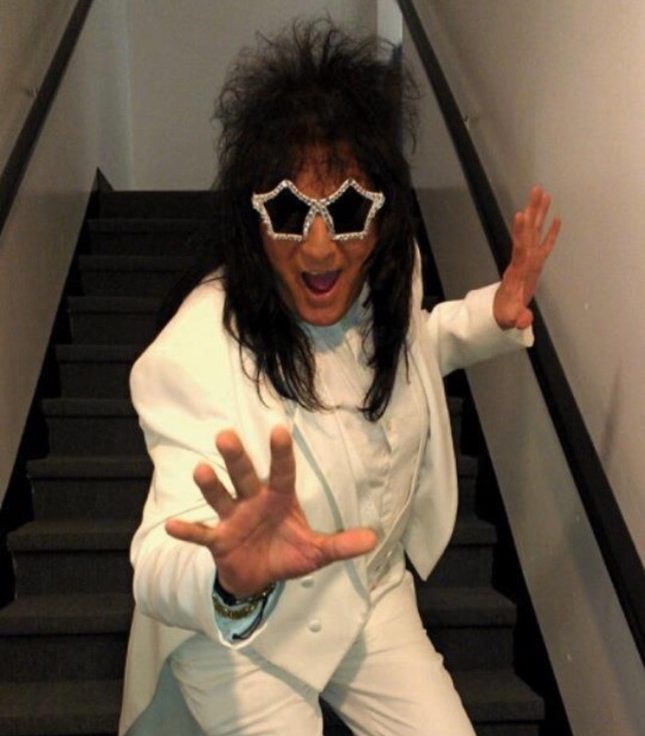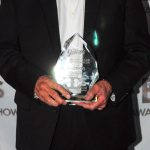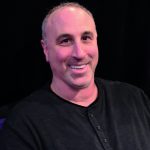Few people are as “visible” at EXPO as the one-and-only Dr. Rock. With his teased hair and boisterous personality, he’s always been passionate about adult clubs, and the Dallas market specifically. Aside from being one of the industry’s most well-known DJs, he’s also been a club owner and manager and once took a bullet from a disgruntled boyfriend when he was trying to protect an abused entertainer. You can’t understand the history of the Dallas club market without hearing about it from Dr. Rock!
(NOTE: This story appears in the September 2024 issue of ED Magazine.)
Talking about the Dallas Metroplex’s adult clubs in their heyday is impossible without mentioning the larger-than-life Dallas DJ, Dr. Rock. In the summer of 1984, before his illustrious DJ career began, Dr. Rock had a construction company building apartments in Dallas. They started work early due to the summer heat and took afternoon breaks at Caligula XXI, a local strip club. Before moving to Dallas in 1982, Rock was in a band that recorded albums and toured in the ‘70s. During a gig in Tulsa, he met a bar manager who later became the day manager at Caligula in Dallas.
The club offered a free lunch with two drinks so Rock and his construction crew would cool off during lunch breaks. One day, Caligula’s day DJ passed out on his birthday after too many drinks. Knowing Rock’s musical background, the manager asked him to fill in. Rock sent his crew back to work and took over as DJ. The rest is history.
ED Magazine Legal Correspondent Larry Kaplan spoke with Dr. Rock about his career as a DJ and the impact music has on the adult nightclub industry.

ED: You quite literally went from working in construction one day to being an adult club DJ the next day. How did that happen so quickly? Why do you think you adapted to being a club DJ so well?
ROCK: That first day as a fill-in was fun, and when the night staff, including the owner, arrived, they were impressed and hired me on the spot. Although I had a booming construction business, I agreed to DJ on Sunday, Monday and Tuesday nights while still running my company during the day.
After a few months, I got pretty good at it. I was a natural, one guy said. The GM approached me and asked, “We think you’re great. How would you like to DJ here seven nights a week?” I said I’ll give you an answer tomorrow. Although construction was booming, I could tell it would slow down. So I told my construction reps we’d finish these current jobs, and then I was getting out of the business to be a gentleman’s club DJ. So I went back the next day and accepted.
ED: When did you leave Caligula?
ROCK: The night manager wasn’t pleased with me after nine months. He called me into the office one night and let me go. I asked why, and he said he didn’t have control over the girls; the girls respected me more than him. And I was making more money than he was. He said he couldn’t have that and was letting you go.
I lived right across the street from another cool competitor club. The club offered me a job earlier, but I’d turned it down. It was a hoppin’ blue-collar crowd with a lot of energy. I knew I could do major things with this club. As soon as I was fired, I drove straight to that other club and talked to the manager. He said the job was still available, so I started working there. It’s called the Fare East, now one of the Burch clubs. It was a high-energy club. I worked with many great girls; it was lots of fun.
He fired six shots, hitting me with one in the leg. I managed to get inside, and a bartender, who was a paramedic student, applied a tourniquet.
– Dr. Rock
In late 1986, I got a call from a friend. They’d just opened a brand-new club in Arlington called Lace. It was the hottest club around, and they wanted me to DJ. They had 16 girls in Playboy. I saw it and thought, “Wow, this club is beautiful and upscale; I can do wonders with it.”
They had a lighting guy who would also spin music; we used to call him a booth monkey. I decided I would be a roaming DJ with a microphone. I’d roll around the club, shake people’s hands, jump on stage and dance with some of the girls. I was the first to start doing that in 1986-87.
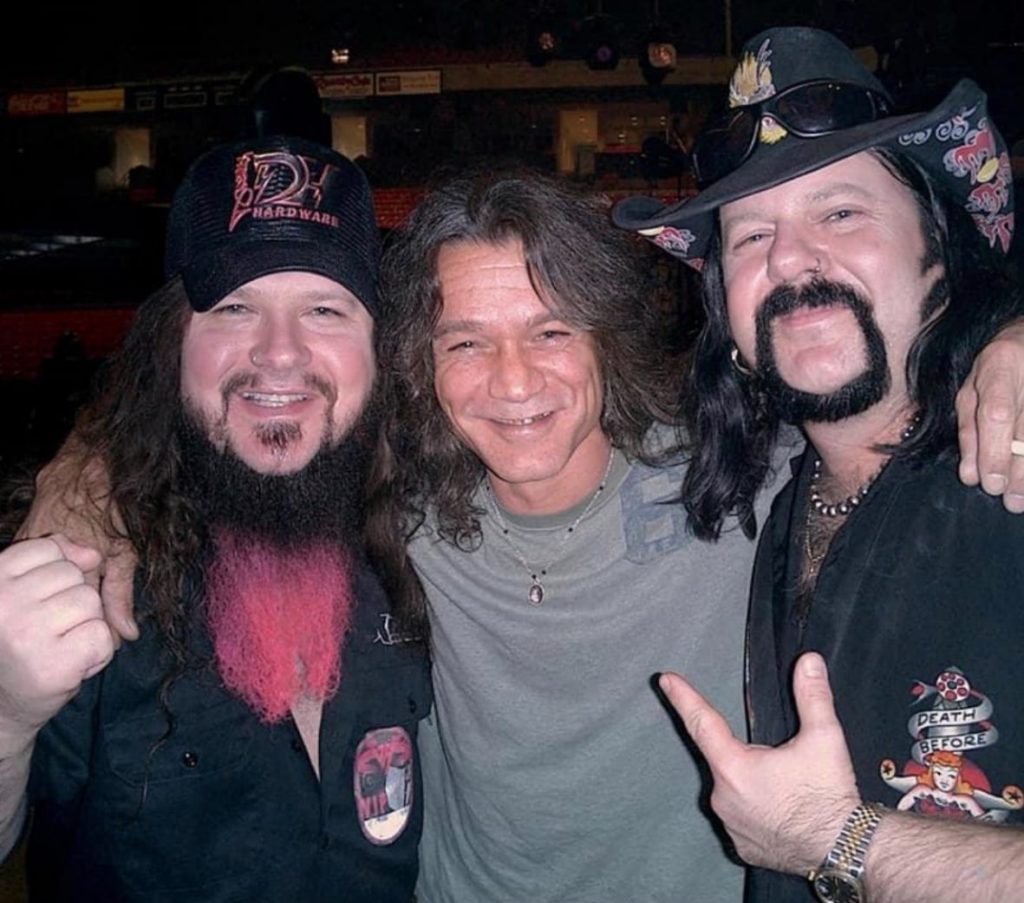
When I first came to Dallas, I met the group Pantera, and we became good friends. In 1992, I met Jeff Murtha. We became fast friends and played basketball every day. Jeff was going to open the first totally nude club in Dallas with Pantera. They asked if I would DJ, and I said, “Well, yeah.” I left Lace, and we opened The Clubhouse on my birthday in December of 1995. I was there for 25 years; I met so many celebrities.
ED: You did some very cool stuff at The Clubhouse. Tell me about “Rock Says.”
ROCK: “Rock Says” used to be a hit at our club. Since we didn’t have a Simon, we did Rock Says with Dr. Rock. We’d get five girls and five guys on stage and play the game. For example, “Rock Says, raise your hand.” Then I’d say, “Raise your right hand,” without adding Rock Says, and half would be out. Eventually, we’d narrow it down to a few people. If a guy won, he’d get two or three table dances. If a girl won, the guy had to buy several dances. Since we were totally nude, we couldn’t sell or give away alcohol as prizes.
ED: Tell me a few Clubhouse celebrity stories.
ROCK: Before they were big, Green Day’s bassist Mike Dirnt DJ’d with me for two hours. Joey Fatone from NSYNC and Chad Kroeger from Nickelback also DJ’d with me, and I have pictures with all of them. I performed for the Dallas Mavericks for 12 years, and after breaking my ankle doing that, I had to stay in The Clubhouse DJ booth rather than my usual roaming. One night, Rob Zombie asked a waitress to have me join him for a shot. I asked him to come to me since my leg was in a cast, and I wanted him to sign it. He came over, hung out and signed my cast. There were dozens of similar stories.
ED: I understand you are a partner in some clubs.
ROCK: Jeff Murtha, myself and a few others own three Hispanic strip clubs called Chicas Bonitas in Dallas, Austin and Las Vegas. Jeff and I also partner with RCI in the Studio 80 dance club in Fort Worth. It takes up a whole city block, 2,000 people on a Saturday night. We also have a champagne club in Plano called Fizz.
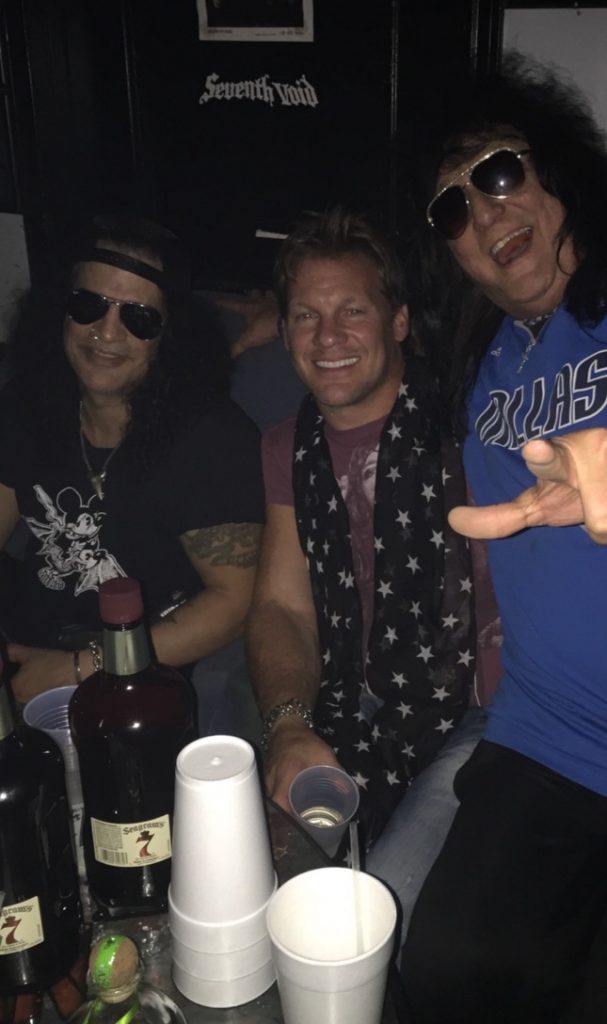
ED: Is it true you were once shot at a club?
ROCK: Yes, back in 1999. I partnered in Club Legacy in Arlington. One of our entertainers had an abusive boyfriend who frequently came in, abused her, and spent her money on other dancers. I often confronted him about his behavior. One slow Monday night, I sent all the managers home and ran the club myself. Around 10:30 p.m., the abusive boyfriend came in drunk and acted up again. I’d had enough and told him he was barred from the club. He refused to leave until I called 911. He then left but later called the club, threatening me with an AK47. I dismissed it, thinking he was just drunk.
At midnight, I escorted a girl to her car and saw the boyfriend’s vehicle. He fired six shots, hitting me with one in the leg. I managed to get inside, and a bartender, who was a paramedic student, applied a tourniquet. The police and ambulance arrived and took me to the hospital. A waitress’ boyfriend had witnessed the shooting, followed the shooter and called 911, providing crucial information.
At the hospital, friends and strippers filled the emergency room. The hospital staff eventually gave me a room, and I stayed awake to see if I made the morning news. I did, as the second headline after Bill Clinton.
The following day, an undercover officer spotted the shooter’s vehicle at a hotel. SWAT found the AK47 in a dumpster and arrested him. In December 1999, he was tried and found guilty on my birthday, receiving a 20-year sentence. He was released in 2019, and I haven’t heard from him since. He shot me on his birthday and was convicted on mine.
I decided I would be a roaming DJ with a microphone. I’d roll around the club, shake people’s hands, jump on stage and dance with some of the girls.
– Dr. Rock
ED: What made The Clubhouse unique?
ROCK: We were the first club in Dallas to go upscale, totally nude and exclusively play rock and roll—no country, hip hop, rap or R&B. We were partnering with Vinnie Paul and Pantera; we became the go-to spot for rock music, featuring bands from the ‘80s like Mötley Crüe, Alice Cooper, KISS, Whitesnake and up-and-coming ‘90s acts like Stone Temple Pilots, Alice in Chains, Rob Zombie, Marilyn Manson, Slipknot, Green Day and Halestorm.
We played only rock music, and on Sunday nights, we featured classic rock from the ‘60s, ‘70s and ‘80s. Jeff introduced the $10 table dance, a first in the industry, which led to lines out the door. Our club pioneered the rock theme and affordable table dances, attracting rock lovers of all ages.
ED: All clubs in the Metroplex weren’t “mega-clubs” or even high-end gentlemen’s clubs. Some still had that honkey-tonk vibe with more of an old-school Dallas flavor. Did you personally like the movement toward high-end gentlemen’s clubs? Or did you prefer clubs with a less “formal” environment?
ROCK: I prefer clubs with a bigger crowd. I’m a personality, not just a DJ. Most club DJs have their DJ lights off; I have my lights on; I want to be seen. I want to get on stage and dance with the girls. I’m an entertainer. So the bigger the club, the bigger the crowd. The bigger the crowd, the better for me. I’m not saying my ego’s out there, but I like being in front of people; I entertain people.
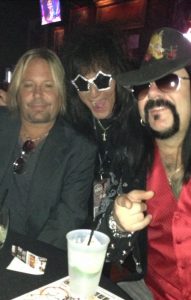
ED: In 2000, ED Publications named the Dallas Metroplex the number one adult nightclub market in the US. If indeed it was, what made it number one?
ROCK: Unlike cities like Los Angeles, the Metroplex strongly supported the gentleman’s club industry. Strip clubs were everywhere, catering to different crowds and different strokes for different folks—blue-collar, ghetto clubs and more—all offering the music people wanted. Dallas truly supported the strip club industry.
ED: Is Dallas still the US’s number one adult club market? If so, why? If not, why not?
ROCK: The only other city I can see that competes with us is South Florida. They have a lot of clubs. Tootsie’s in Miami is the only club nationally that beats Baby Dolls in liquor sales. But I think, overall, Dallas is still the number-one market in the US. There are more clubs, and the people still support them here in the DFW area.
ED: How have the Dallas clubs changed in the last 25 years?
ROCK: Today’s generation prefers EDM, hip-hop and rap over rock. Many clubs have adapted to this change, but Baby Dolls remains consistent, playing country every three songs, along with classic rock and top 40—no hip-hop or rap. This mix attracts an older crowd, helping to make us number one in liquor sales in Texas and number two nationally.
ED: What changes do you foresee for the Dallas adult nightclub market in the next five years?
ROCK: I don’t foresee any changes. Each club will continue with their current music styles. Baby Dolls’ music format won’t change. We cater to an older clientele that enjoys Bon Jovi, Mötley Crüe and Alice Cooper, along with Dua Lipa, Ariana Grande and top-40 hits.
Larry Kaplan has been the legal correspondent for ED Magazine for 24 years. Mr. Kaplan is a broker in the sales and purchase of adult nightclubs and adult retail stores and the Executive Director of the ACE of Michigan adult nightclub state trade association. Contact Larry Kaplan at 313-815-3311 or larry@kaplanclubsales.com.


